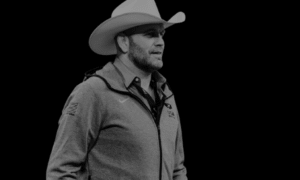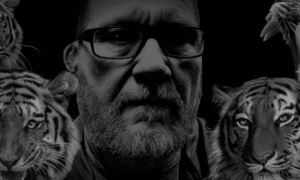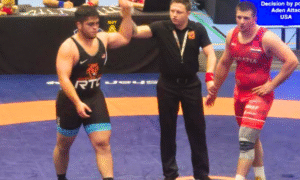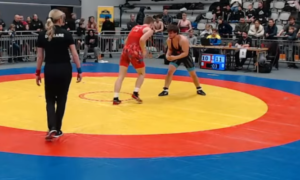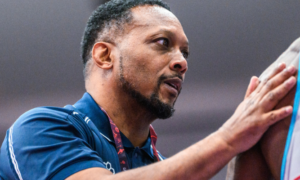Five Point Move is proud to host USA Greco-Roman National Team head coach Matt Lindland each week for Coach Lindland’s Report. Here is where you will find detailed perspectives from Coach Lindland regarding results, training philosophies, upcoming events, and other Greco-related news that isn’t available anywhere else. ALSO — if you would like to donate directly to the US Greco-Roman program, just click here. Your support is appreciated!
It has been nearly a month since the last Coach Lindland’s Report, due in large part to the US Seniors spending a couple of weeks in Denmark, which played host to the annual Thor Masters Invitational. Performances from that event are covered as Coach Lindland talks about the silver medals from Randon Miranda (55 kg, NYAC/OTS) and Jesse Thielke (63 kg, NYAC), and the bronze earned by RaVaughn Perkins (72 kg, NYAC). The corresponding training camp in Denmark is discussed first and included later in the conversation are the ambitious efforts coming out of the US program to offer more opportunities to developing prospects.
5PM: What were the highlights of the training camp in Denmark as far as productivity and what you wanted to see get accomplished beforehand?
Coach Matt Lindland: Well, the highlight was we got a lot of mat time. Every athlete had two sessions a day, hence the coaches, namely me, had four sessions a day. Over the last few days of camp a few nations were taking off to do other things. Germany and Hungary left, so that whittled it down to a few less nations and we had two sessions for those last few days.
But we were wrestling every practice. You know, get a warm up, a little play wrestling, and then Let’s go, let’s scrap. There were many different situations on our feet, from par terre. We went full matches, we did situations, top and bottom, and there were just a lot of different training partners, which was such a huge benefit. You were able to get so many different looks.
For instance, you had (Dominik) Etlinger and (Alex) Kessidis in one weight class (laughs). Two completely different body types. That’s just a great example because Alex is all tall, long, and lanky. He also wrestles a wide-open style. Then you’ve got Etlinger, who is just a little ball, you can’t get an underhook on the guy for nothing. You have to use a crowbar to get your arm in there he’s so compact (laughs). You’re going to wrestle so many different styles at a camp like that and it is just so beneficial to have that many body types in one place. There were nine different heavyweights at camp. It was incredible the amount of partners everyone had access to.
And it was a great group of guys. Just quality individuals with no egos. Everyone just wanted to get better from top to bottom. I also mentioned before that there would be a great group of coaches to work with. We just sat back and worked with our guys and let Szymon (Kogutrun) run the practices. It was a nice opportunity. When you’re not having to run practice you can actually focus on your athletes and see things they are doing that they can improve on. That’s what I was really happy about.
Unfortunately, we did have a few injuries, some guys got stomach aches. Lasted for a day, one guy it lasted for a couple of days. But it was a lot of hard wrestling and I think we had a couple of athletes coming in who were already banged up a little bit, as well. That kind of long training camp really exacerbates any injuries you might have going into it. We also had a couple of guys get banged up in the tournament.
5PM: Speaking of the tournament, performances overseas have a tendency to mean more for some athletes than they do for others, depending on recent history, activity levels, and whatever other variables. I felt Jesse Thielke looked extremely impressive, and as close to full capacity and his old self as he did leading up to Rio. Did you feel the same?
ML: I feel like Jesse has gotten himself into a great training situation right now. He’s in a better space mentally. He’s just able to perform. Jesse realizes what he is capable of doing, he loves the sport of wrestling, and I think he doesn’t want to miss the opportunity to capitalize on the chance to win a medal in Tokyo. I think he wants to try and grab a couple of medals on the way to Tokyo, and maybe 63 kilos is where that happens for now. I don’t know if he will be going up or down (in weight). Right now I think he is still trying to figure things out. I wish I had that answer so I could help him plan and prepare.
But wherever Jesse is at, he’s going to do phenomenally. If he keeps the attitude he has right now, if he’s healthy, if he is wrestling wide open like he’s capable of doing…I mean, he went out there and just attacked guys. He tech’ed his first opponent. He then went out there against Mate (Krasznai) and it was 4-0, he didn’t give up any points. In the finals, he was wrestling, he was scrapping.
One thing we talked about afterwards was, Oh coach, I didn’t eat all day. That certainly affects your performance. Two days of weigh-ins and you’re competing all day, and you forgot to eat? That’s something we were diligent about when we were working to get ourselves qualified (for the Rio Olympics). That was something we talked about, we trained it, and we put that into our ritual. What do we do after every match? Seven-minute cooldown, hydrate, get some fuel in you, get your arms and legs rubbed out, get a massage from the trainer. We were consistently doing that, so I don’t think Jesse was 100% back mentally as far as his routine.
That was something we spent some time talking about related to his performance, and how good he felt when he was doing those things. They might be little things but they can have a huge impact on your performance. If you don’t eat all day and you’re not wrestling until the evening, you won’t have the energy you had in the morning. It showed, and I think we figured out why.
But yes, Jesse did great. I loved having him on the trip. He was a contributor in every way possible as far as what you’re looking for out of a teammate and an athlete.
5PM: Randon Miranda has been on a streak, this was his fifth straight overseas final. He caught a very tough opponent in the finals, a big guy…
ML: He was a long guy, yeah.
5PM: Randon has taken steps lately and this was a pretty major Senior trip. What’d you like about his time in Denmark?
Coach Matt Lindland: I liked the fact that I had the chance to work that camp with him at Utah Valley a few months ago. I really enjoyed having the time to work one-on-one with him and Taylor (LaMont). I got to learn about Randon more and his style. I’ve watched him, I’ve seen him compete well. The first thing that comes to my mind is, Wow, this kid is very slick. But he’s really a counter-wrestler. When a guy attacks him, he is able to maneuver and score on his opponents very effectively. He also doesn’t like to exert a ton of unnecessary energy, which is an important quality in an athlete. You want to minimize the amount of energy you use while maximizing that amount of energy during those six minutes.
What we discovered is that if we attack right away and put some points on the board, now the opponent really has to come to him and try to score. That is going to open up more of Randon’s offense and you saw that happen in the earlier rounds. He went out, attacked, put some points on the board, and then his opponents had to come to him. He had a couple of tech falls in the tournament and another match where he scored some big points. Randon was out there scoring points in his matches because he controlled the lead and he kept wrestling with the lead. So many times we see our athletes, especially our younger guys, and they don’t know how to manage that lead. They go out there, score, and then it’s like, Okay, now I’m going to just try and hold onto this lead, instead of continuing the match and going for the tech fall or pushing their opponent to the bitter end. You know, we’ve mentioned this before and I think it is a bit of fear. It’s saying, Oh, I don’t want to lose this, I’ve got the win. But you don’t have the win, there are still four or five minutes left in the match and we’re trying to hold onto leads.
I think getting the chance to work with Randon out in Utah got me to understand his style, and him to understand my philosophy and how effective that philosophy can be. He implemented that in this tournament and really had a great performance. I was very happy to see his progress as an athlete and international competitor. Randon is now someone international coaches and opponents are looking at saying, Alright, who is this guy? He is going to be a threat and we have to watch out for him. So it was nice to see Randon go out there and have a great performance.
5PM: RaVaughn might not have earned a gold but he wasn’t really outdone by anyone, he looked fantastic. He wrestled very well in November but at Thor Masters, he was back at his normal weight and considering all the physical stuff he has dealt with, the way he competed had to have been an encouraging sign, especially with how he was winning his matches.
ML: Yeah, RaVaughn is a very violent wrestler, especially with the way he gets to the body and finishes his techniques. I love to watch the guy wrestle. He’s not flashy but the amount of violence he employs is very fun to watch. RaVaughn is very strategic in his approach to getting to his positions. This is exactly what I want to see out of a guy: fight, fight, and keep fighting until you get to your positions. Don’t fight for a little bit and then say, Okay, I’m going to try for something else before going back to what I want. Instead, decide that you’re going to get to your positions and execute your techniques from the positions you are comfortable in. And hopefully, your opponent isn’t as comfortable because it is you who is controlling the position. I would think that your opponent wouldn’t be as comfortable because you’re the one who is controlling the dominant position.
That was really fun to watch, RaVaughn saying, This is what I want to do, and then executing what he wanted to do. And he did a great job, what he win, like five matches or something? He had a crazy amount of matches. Big brackets plus the Nordic system means a lot of match time. But RaVaughn is still dealing with some injuries, he just has to continue to rehab, and he will. He’ll get to where he needs to be.
He is another guy who did everything you could ask of him throughout the camp. It kind of shows because this year he was one of the Jacob Curby award winners, which is all about character, doing the right things, and being a good teammate. I remember when I was on the team and we had guys who were maybe heading down the wrong path or they were doing something they shouldn’t have been, and we called each other out on it. We had that relationship with our teammates where if something was going on it was like, What are you doing? Straighten yourself up. And I think guys in the current generation are hesitant to call one another out on their bullshit. RaVaughn isn’t. He is able to do it, and that is because he is constantly doing the right things. It’s one thing to lead by example, but sometimes people don’t look at that example.
For instance, everyday we ate in the same cafeteria. You would take your dishes and put them on the cart when you were done. There was one athlete who everyday, consistently, would just get up, walk out, and leave his plate. It wasn’t because he was being a rude individual, he just didn’t have the awareness that there was a cart to put your plate and silverware on. So everyday, his teammates would just pick up his plate, but they were complaining about it and bitching about it instead of confronting him (laughs). I actually heard a funny story, some of them were saying that they wanted to stand up and leave their plates while this athlete was still eating. It was like, Yeah, why don’t you do that? You would make a point. Right? The guy would go, Oh, there’s a cart over here I should be putting my plates on. Because sometimes you don’t know you’re messing up and you don’t have someone who cares enough about you to tell you the deal, and that is what this really is. I mean, I know these guys enjoy one another’s company, they are great teammates, they care about each other…but they are so afraid to offend. Isn’t that the point of correcting someone? You offend them, they see what they’re doing wrong, and then they correct themselves? That’s the whole point of being critical of someone, to somehow offend them enough to where they make a change in their behaviors and they fly straight, for whatever that’s worth.
We’re starting to see guys like RaVaughn step up and do those types of things, but he does them in his own way. He is very soft spoken, he’s very subtle about it. RaVaughn will pull someone aside and talk to them, he wouldn’t call them out in front of others. Everyone is going to have their own style of doing that, but we need more of it. We need more of these guys who care enough about one another that they are willing to call each other out on their BS.

Perkins (top), shown here pinning Toni Ojala of Finland, won five matches en-route to bronze at the 2018 Thor Masters. (Photo: PL-Photo.dk)
5PM: The Juniors in Austria knocked out eight medals and what I think is important about that is out of the eight medals, only two of them came from returning medalists, Alston Nutter and Cohlton Schultz. The fact that six other young guys performed well and made the podium won’t get the same amount of attention as other events we have in this country, but it is hard evidence of development. Two of the winners were 17 years old and had only competed overseas a couple of times prior. Three years ago at the Austrian Open there were only two medalists, period. Look at what’s happening now, this is consistency, which appears quite striking when you compare recent years.
ML: It is, it is actually very exciting to see us heading in that direction to where we are consistently putting some of these young developmental athletes on the podium. It looked like a very tough tournament, they had a lot of participation and a lot of different nations there. When I went three years ago, yeah, we didn’t have that good of a performance, and that is what we’ve been trying to do, change this. We want to get guys more time and experience overseas. This year we are going to have multiple opportunities for our developmental athletes to go overseas and compete against these athletes.
I’ve been saying it forever, I know we have the best athletes, we just compete in the wrong style in our country and then we think we’re going to go over and perform internationally in Greco-Roman. That’s just not the case. We need to have guys who are training and consistently competing in Greco-Roman to get that kind of performance. You’re right about us not getting headlines in Austria. There were major folkstyle tournaments going on, college and high school state tournaments. This is a folkstyle nation.
I remember when I was a young athlete in high school, which was when I pretty much started wrestling, the minute the state tournament was over there were no more folkstyle events. Now? I don’t think there is ever a break in folkstyle in our country. You would think that at least after the NCAA tournament there would be no more folkstyle, but there will still plenty of guys doing it. Again, I don’t care about every athlete in our country. I just want the guys who truly love and want to wrestle Greco-Roman get an opportunity to do so without being forced to participate in a style that doesn’t fit them.
Creating opportunities for athletes to wrestle Greco year-round overseas is important and we have those in place. They just have to have the courage to say, This is what I want to do, and then follow their own path and vision for what they want to do. If their goals are to win Olympic and World medals, then let’s stop doing the folkstyle-high school-college thing and start getting ourselves overseas competing and realizing that we can compete with the best international athletes. If we’re training and spending time in the areas in which we need to improve on, there is no question we can take over and in very short time.
Our goal is to get more people involved. We’re holding workshops throughout the year. We had one this past week at the NCAA’s, Andy (Bisek) did one a couple of weeks ago at the Big Ten tournament, and Gary (Mayabb) is going to get the list out with all of the other workshops going on. But that is just to get some of the interest sparked. The real fun happens when we get them overseas and they start understanding what it’s like to compete.
I just posted a video to my Coach Matt Lindland Facebook (below) with these six or eight-year-olds bodylocking and arm-throwing each other. You don’t see that in our country. What you see is passive wrestling. Avoidance. Folkstyle is really about control, it’s not about scoring. So you don’t see guys taking big risks, unless it’s Bo Nickal from Penn State, or maybe a couple of others. There are a few guys who are bold and will go out there to make things happen. But it’s difficult because your opponent is allowed to back off the mat, block, push away. If you really love and want to compete, you should appreciate the art of Greco-Roman.
5PM: Mayabb’s clinic in Cleveland, Bisek at Michigan State, the Big Brother camps at NMU, are these the types of educational/seminar situations you spoke about following the summer that the National program wanted to institute in effort to offer more developmental opportunities?
Coach Matt Lindland: The vision is to create more opportunities and expose more athletes to Greco-Roman. It was beautiful, the first Big Brother Camp at NMU filled up quickly, so Coach (Rob) Hermann and Andy decided to hold another one next month, and that camp is filling up, as well. I think part of it is that we have our own platform now on Five Point Move, that definitely helps us get the information out and share this vision with the athletes and coaches who care about what we’re trying to do.
But yes, we as a staff had a vision to create multiple opportunities, which was why it was so important for us to hire a person like Gary who can manage all of the different age-group developmental activities we want to put together. The overseas trips, the workshops, and then the week-long camps we’ll also be holding throughout the summer, plus getting our teams selected and getting those athletes out to our World Team camps is going to be critical, as well. Creating more and more opportunities and just extending the Greco season to where Greco is taking up the whole year instead of letting folkstyle do that.
I’ve got a great opportunity for our two’s and three’s to go back to Denmark in October. They are going to be building a new training center that is not only going to have much, much more mat space, but they are actually going to be able to host the events in this new center. Their government and their club supporters have poured a ton of money into this facility and they are hoping to have it done by the end of the summer, and then they are planning to hold a Junior and Cadet event in October. I’d like to see our two’s and three’s who didn’t get a chance to go to the World Championships get that chance to compete in October. Even if we do have guys going back to folkstyle in November/December, at least they are bookending their seasons with major international events. Austria is always kind of the beginning of the bookend. As you saw, we had a bunch of high schoolers who were able to attend that with us.
It’s just about creating more and more opportunities so they don’t have an option to wrestle folkstyle (laughs). There are so many opportunities for them to wrestle the style they want. And I think that has been the argument in the past, There just aren’t enough opportunities. Well, there may not be a lot of opportunities in the US because this is a folkstyle nation. But — if you want to be a Greco-Roman athlete there are going to start being a lot more opportunities and we’re going to create those for you. Whatever is going to be that catalyst for growth and change, we have to keep these opportunities in front of our athletes as much as possible. At the end of the day, it’s up to these athletes to be bold, speak up, and say, This is what I want to do. I want to wrestle Greco-Roman and there is no excuse because there are opportunities to do it. They won’t have to go back to a folkstyle system.
Be sure to follow Coach Matt Lindland on Facebook, Twitter, and his official blog for updates on the US Greco-Roman Wrestling program.
SUBSCRIBE TO THE FIVE POINT MOVE PODCAST
iTunes | Stitcher | Spreaker | Google Play Music | RSS



